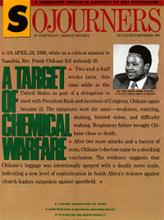The month of August marks the 44th birthday of the nuclear age. On August 6, 1945, the United States dropped the first atomic bomb on Hiroshima. August 6 also marks the fourth birthday of Soviet President Mikhail Gorbachev's nuclear disarmament offensive. It was on that day in 1985 that the Soviet Union began its unilateral moratorium on nuclear weapons testing. That moratorium lasted for a year and a half while the Soviets waited in vain for a reciprocal response from the United States.
Four years ago, official American opinion held the test moratorium to be a clever piece of "Red" trickery. But time has proven that it was only the first shot in Gorbachev's ongoing campaign to create a breathing space for his domestic reforms by demilitarizing and defusing the East-West conflict. In the months and years that followed, Gorbachev made a series of ground-breaking proposals aimed at dismantling many of the nuclear and conventional military barricades of the Cold War. One of Gorbachev's proposals, his unconditional acceptance of the "zero option" on intermediate-range nuclear missiles in Europe, proved irresistible even to the Reagan administration.
Since the completion of the Intermediate-Range Nuclear Forces (INF) agreement, Gorbachev's peace offensive has continued unabated. The Soviets are out of Afghanistan and are cooperating in the resolution of "regional conflicts" in southern Africa and Indochina. They are also currently implementing a unilateral reduction of their European troop strength and observing a unilateral moratorium on the production of weapons-grade plutonium. But responses from the Bush administration have not been forthcoming.
Read the Full Article

